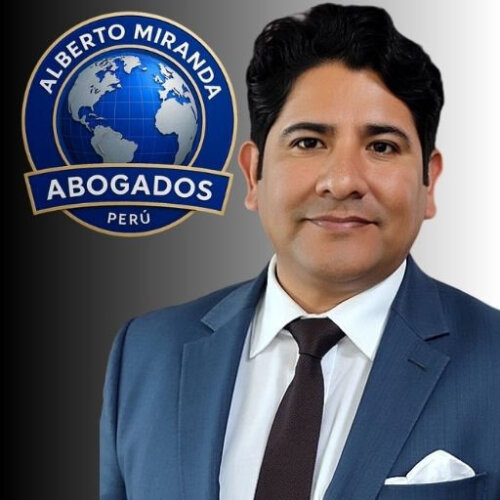Best Private Equity Lawyers in Peru
Share your needs with us, get contacted by law firms.
Free. Takes 2 min.
Or refine your search by selecting a city:
List of the best lawyers in Peru
About Private Equity Law in Peru
Private equity involves investment in private companies or unlisted businesses with the goal of driving their growth, restructuring, or improving their operations to eventually generate returns through a sale or public offering. In Peru, the private equity market has been developing steadily, attracting interest from both domestic and international investors. This field covers a wide range of activities, including the formation of investment funds, mergers and acquisitions, and portfolio company management. Legal frameworks in Peru are designed to encourage private investment while ensuring transparency, regulatory compliance, and protection for all parties involved.
Why You May Need a Lawyer
Engaging a lawyer experienced in private equity in Peru is common and highly recommended due to the complexity and legal significance of these transactions. Here are some typical scenarios in which legal assistance can be crucial:
- Forming a private equity fund or investment vehicle
- Negotiating and drafting investment agreements
- Conducting legal due diligence on target companies
- Structuring mergers, acquisitions, or divestments
- Ensuring regulatory compliance with financial and securities laws
- Resolving conflicts among investors or with company founders
- Managing tax and cross-border issues for international investors
- Protecting intellectual property and confidential information
Local Laws Overview
Peru's regulatory environment for private equity is shaped by several key statutes and overseen by government agencies. The most relevant local laws and regulations include:
- Capital Markets Law: Sets the framework for investment funds, public and private offerings, and investor protection.
- Company Law: Governs the creation, structure, and operation of corporations and partnerships, which are common vehicles for investments.
- Securities Market Superintendence (SMV): The regulator that supervises investment funds, securities offerings, and market participants.
- Foreign Investment Law: Provides equal treatment for foreign and local investors, allowing 100 percent foreign ownership in most sectors.
- Tax Laws: Address the tax treatment of investment returns and transactions involving capital gains, dividends, and repatriated profits.
- Anti-Money Laundering Regulations: Impose requirements for the identification of investors and reporting of suspicious activities, especially relevant for fund managers.
Navigating these legal aspects is vital to ensure that private equity investments are sound, enforceable, and compliant with all Peruvian regulations.
Frequently Asked Questions
What is considered a private equity investment in Peru?
A private equity investment typically involves placing capital in unlisted companies, startups, or growth-stage businesses in Peru, with the goal of achieving significant returns through management support, value creation, and eventual exit strategies like resale or initial public offering.
Who can establish a private equity fund in Peru?
Both domestic and foreign entities, including corporations, financial institutions, and professional fund managers, can establish private equity funds. These funds must be registered with the Securities Market Superintendence (SMV) if they wish to raise capital from third parties.
Are there any restrictions on foreign investment in private equity?
Peru generally allows unrestricted foreign investment in private companies and private equity funds, except for specific strategic sectors such as defense and national security, where certain limitations can apply.
What kind of legal due diligence is required in private equity deals?
Due diligence typically includes a comprehensive review of a target company’s corporate structure, contracts, regulatory compliance, labor issues, tax status, assets, liabilities, intellectual property, and legal risks. This helps protect investors from unforeseen legal issues.
How are private equity transactions taxed in Peru?
Taxation varies based on the structure of the investment and the participant's residency. Capital gains, dividends, and interest income can be subject to different rates. Engaging a tax advisor or lawyer is essential to optimize tax efficiency and ensure compliance.
Do private equity funds need to be registered with Peruvian authorities?
Yes, if a fund raises capital from public or institutional investors, registration with the SMV is required. Private arrangements among a limited number of investors may not require this registration, but legal advice is recommended.
What protections are available for minority investors?
Peruvian law contains certain protections for minority investors, such as rights to information, pre-emption rights on share issuance, and legal remedies against abusive actions by majority shareholders. These rights can also be enhanced by tailored shareholder agreements.
Can private equity firms exit investments easily in Peru?
Exit options include share sales to third parties, buybacks, mergers, and public offerings. The feasibility depends on the sector, market conditions, and any restrictions in shareholders’ agreements. Legal guidance is crucial for structuring a smooth exit.
What is the role of the Securities Market Superintendence (SMV) in private equity?
The SMV is responsible for overseeing and regulating securities markets in Peru, including the registration and supervision of collective investment vehicles like private equity funds. It ensures transparency, investor protection, and fair market practices.
What are the common legal pitfalls in Peruvian private equity?
Common legal challenges include unclear contractual terms, regulatory non-compliance, insufficient due diligence, tax missteps, unresolved intellectual property issues, and poorly structured governance arrangements. Working with experienced legal counsel helps avoid these pitfalls.
Additional Resources
Several organizations and governmental bodies can provide valuable information and support related to private equity in Peru, including:
- Securities Market Superintendence (Superintendencia del Mercado de Valores - SMV)
- Ministry of Economy and Finance (Ministerio de Economía y Finanzas - MEF)
- PROINVERSIÓN (Private Investment Promotion Agency)
- Peruvian Private Equity & Venture Capital Association (Asociación Peruana de Capital Semilla y Emprendedor - PECAP)
- Chambers of Commerce and legal firms specialized in corporate and financial law
These organizations can provide regulatory guidance, investment data, business opportunities, and lists of accredited professionals.
Next Steps
If you are considering a private equity investment or need legal support in Peru, consider the following steps:
- Define your investment goals and determine the preferred structure for your fund or project.
- Engage an experienced Peruvian lawyer or law firm with expertise in private equity, corporate law, and financial services.
- Arrange a consultation to evaluate your plans, identify possible legal risks, and discuss regulatory compliance requirements.
- Prepare a thorough plan for due diligence, contractual arrangements, and tax optimization with your legal counsel.
- Stay updated on any changes to relevant laws and market practices throughout the investment cycle.
Professional legal assistance is essential for navigating the complexities of private equity transactions in Peru, ensuring risks are minimized and opportunities are maximized.
Lawzana helps you find the best lawyers and law firms in Peru through a curated and pre-screened list of qualified legal professionals. Our platform offers rankings and detailed profiles of attorneys and law firms, allowing you to compare based on practice areas, including Private Equity, experience, and client feedback.
Each profile includes a description of the firm's areas of practice, client reviews, team members and partners, year of establishment, spoken languages, office locations, contact information, social media presence, and any published articles or resources. Most firms on our platform speak English and are experienced in both local and international legal matters.
Get a quote from top-rated law firms in Peru — quickly, securely, and without unnecessary hassle.
Disclaimer:
The information provided on this page is for general informational purposes only and does not constitute legal advice. While we strive to ensure the accuracy and relevance of the content, legal information may change over time, and interpretations of the law can vary. You should always consult with a qualified legal professional for advice specific to your situation.
We disclaim all liability for actions taken or not taken based on the content of this page. If you believe any information is incorrect or outdated, please contact us, and we will review and update it where appropriate.
Browse private equity law firms by city in Peru
Refine your search by selecting a city.











